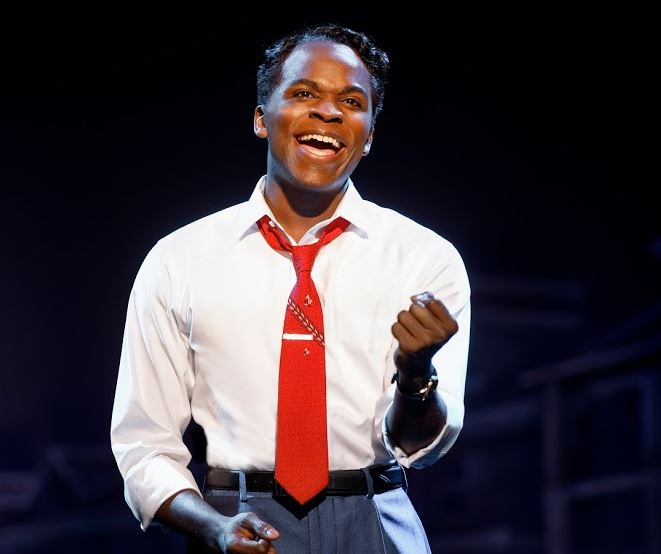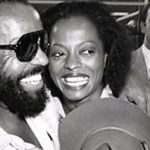‘Motown’ Has the Horses, But Story Is Sitting in the Barn

In 25 years, Berry Gordy’s (Kenneth Mosley) fiery posturing would fade to exhaustion. Photo by Joan Marcus.
“It ain’t your music to take!!” the latter sizzes amid half-cocked fists.
Detroit native and Motown Record Corporation founder Berry Gordy III would have left his feet at such an exchange. For sure, he was a poor young black guy who faced enormous odds in creating a legitimate business model in 1950s and ‘60s America; but he also understood that the best music is a respecter of neither commerce nor race.
Motown the Musical, current Broadway San Diego entry and a 2013 Tony nominee in its own right, is the self-written and co-produced portrayal of Gordy’s life, adapted from his print autobiography — and even as it’s topheavy with Motown hits by the household names who released them, little of the action captures Gordy’s acumen outside his keen eye for cultural trends.
I liked it OK, I guess. Then again, I grew up in that era, about an hour south of Detroit to boot. Chances are excellent that your patronage isn’t quite that captive.
(O)h, he says, for the unfettered joys of youth . . .
The brassy early Motown sound was flush with the strains of youthful abandon as Gordy set about discovering its anchor acts, like The Temptations, The Supremes and Smokey Robinson (whom Bob Dylan once called “the greatest living American poet”) — but this is 1983, and we’re at a televised 25th company reunion, one that Gordy is loath to attend. A lifetime of professional disillusionment and personal loss has gotten the best of him; oh, he says, for the unfettered joys of youth, marked by his stark admiration for the likes of the great Joe Louis.
That inner spunk would propel his journey into songwriting, then entrepreneurship, then a steamy romance and a child with star-struck Diana Ross, even as assassination, war and domestic strife peppered a music explosion that refused to die.
If the Beatles took over the world (which they did), then guys like The Beach Boys and The Four Seasons were their masters at arms, with a plucky Gordy carving a colossal chunk of the urban Midwest and beyond for himself (at 88 and married four times, he’s built a fortune of $350 million).
This show (trades) story for anthology and (loses) track of Gordy the man in the process.
I’ll leave it to you to find out if Gordy shows up at his own party — but you’ll have to steer through a disparate menu of events to find out. The brutal 1955 killing of 14-year-old Emmett Till, beaten and lynched for allegedly whistling at a white woman; a segregation movement that culminated in the Birmingham riots of 1963; the Kennedy and King assassinations; the dizzying Vietnam conflict that could have threatened a national insurrection; the death of Gordy protege Marvin Gaye at his father’s hands; the stubborn, happy veneer that birthed The Four Tops, Martha and the Vandellas and The Jackson Five in spite of it all: This show runs out of breath well before it’s through, trading story for anthology and losing track of Gordy the man in the process.
Surely, Joe Louis and Diana Ross weren’t the only influences to steel Gordy against the world’s murky commercial depths. Amid the show’s 943 plot points, we’ll never know.
Please do enjoy Kenneth Mosley, whose Gordy is eternally youthful and exceptionally bright. He lives for the character’s context, which swings wildly between the commercial and the deeply intimate, chiefly in the scenes with Trenyce as Ross. For her part, Trenyce’s talent for imitation is spot on amid her breathy inflections (“Love Is Here and Now You’re Gone”) and diva Ross’ obsession with the spotlight.

Berry Gordy and Diana Ross were an item in the 1960s, just like the domestic and world upheavals around them. Public domain image.
Ethan Popp’s music arrangements evoke strong Motown memories without relying on note-for-note reproduction — and given the show’s nearly 60 selections and slivers thereof, that’s a good thing. Popp nicely exploits the performers’ chemistries in group situations (“Ball of Confusion,” The Temptations’ rock-infused screed on the state of the world, is absolutely magnificent).
David Korins’ sets and Emilio Sosa’s costumes uphold Broadway San Diego’s imposing technical traditions — sadly, director Charles Randolph-Wright isn’t afforded the same consideration in terms of the spotty story. While Motown has left an indelible mark on the American music experience, this show’s glut of disturbing attendant history fails to exploit the sprawling humanness behind it.
This review is based on the opening-night production of Dec. 27. Motown the Musical runs through Dec. 31 at Civic Theatre, 1100 Third Ave. downtown. broadwaysd.com, 619-544-1100.
